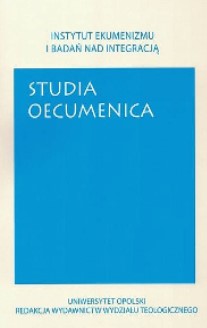Propheticness of the ecumenical social thought: the “Life and Work” Oxford Conference about the state and economic order
Propheticness of the ecumenical social thought: the “Life and Work” Oxford Conference about the state and economic order
Author(s): Piotr KopiecSubject(s): Christian Theology and Religion, History of Church(es), Welfare systems, Systematic Theology, Socio-Economic Research, Sociology of Religion
Published by: Uniwersytet Opolski
Keywords: Life and Work; Propheticness; ecumenical social thought; World Council of Churches; welfare state;
Summary/Abstract: Propheticness understood as a Christian interpretation of the world’s spiritual, ideological and social challenges, is the primary dimension of ecumenical social thought. History of the ecumenical movement has many times confirmed this prophetical vision which often ran counter to or preceded dominant political and socioeconomic orders. The World Council of Churches’ model of responsible society has exemplified such a vision. Although today forgotten, a prophetical voice of ecumenism sounded at the conference of the Life and Work movement held in Oxford in 1937. The gathering, even though it took place in a gloomy time of political totalitarianism and socioeconomic crisis and in the shadow of the oncoming world war, produced a theological interpretation of the state and the economy, which later became an abundant source of ideas for the next decades of the ecumenical social teaching. The article aims to manifest the comprehensiveness and freshness of the Oxford concepts and, thereby, to demonstrate the Propheticness of ecumenical social thought. Eventually, it wishes to prove the relevance and significance of ecumenical teaching about society today. A survey of the subject literature and literary analysis is the primary method svemployed in the article.
Journal: Studia Oecumenica
- Issue Year: 2022
- Issue No: 22
- Page Range: 7-21
- Page Count: 15
- Language: English

